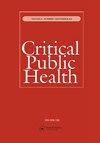抵抗经济
IF 2.3
3区 医学
Q2 PUBLIC, ENVIRONMENTAL & OCCUPATIONAL HEALTH
引用次数: 0
摘要
经济生活的社会组织在汇集许多新出现和持久的健康问题方面起着关键作用。然而,纵观最近全球卫生挑战的历史,强调经济制度的影响往往被放在一边,而更倾向于研究这些问题的行为和/或文化层面。全球抗微生物药物耐药性危机提供了这一趋势的一个显著例子,分析经常并日益侧重于行为或技术解决方案——例如,需要负责任地使用剩余的抗微生物药物,或重新努力确定新的抗微生物药物——而有时却掩盖了再现问题本身的市场逻辑。除了少数明显的例外,影响当前抗菌素耐药性(AMR)场景的经济逆风在很大程度上已经分散在学术讨论中。在这篇文章中,我们主张对耐药性经济进行批判社会学,为理解经济结构如何塑造抗生素耐药性的加速和破坏药物和诊断解决方案的发展做出贡献。本文章由计算机程序翻译,如有差异,请以英文原文为准。
Economies of resistance
The social organisation of economic life plays a pivotal role in assembling many emerging and enduring health problems. Yet throughout the recent history of global health challenges, an emphasis on the influence of economic systems has frequently been sidelined in favour of research that interrogates the behavioural and/or cultural dimensions of these problems. The global crisis of antimicrobial resistance provides a striking example of this trend, with analysis frequently and increasingly focusing on behavioural or technological fixes – for example, the need for responsible use of remaining antimicrobial drugs, or for revived efforts to identify new antimicrobial agents – while at times glossing over the market logics that reproduce the problem itself. With a few notable exceptions, the economic headwinds that shape the current antimicrobial resistance (AMR) scene have been largely decentred in scholarly discussions. In this article, we argue for a critical sociology of economies of resistance, contributing to burgeoning efforts to understand how economic structures both shape the acceleration of AMR and undermine the development of drug and diagnostic solutions.
求助全文
通过发布文献求助,成功后即可免费获取论文全文。
去求助
来源期刊

Critical Public Health
Multiple-
CiteScore
5.90
自引率
7.10%
发文量
36
期刊介绍:
Critical Public Health (CPH) is a respected peer-review journal for researchers and practitioners working in public health, health promotion and related fields. It brings together international scholarship to provide critical analyses of theory and practice, reviews of literature and explorations of new ways of working. The journal publishes high quality work that is open and critical in perspective and which reports on current research and debates in the field. CPH encourages an interdisciplinary focus and features innovative analyses. It is committed to exploring and debating issues of equity and social justice; in particular, issues of sexism, racism and other forms of oppression.
 求助内容:
求助内容: 应助结果提醒方式:
应助结果提醒方式:


